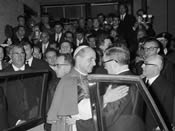In the narrative of the Passion of our Lord in the Gospel of St. John (which is read in the liturgy of Good Friday), there is a scene where Pontius Pilate asks Jesus the question, “What is truth?” Quid est veritas? (Jn 18:38) Unfortunately, in obvious bad faith—that is, without wanting to know the answer—Pilate turns away before our Lord could give a reply, thus depriving us of what would surely have been a perfect definition.
Still, since it is intolerable that such a fundamental concept should remain unarticulated, it can be said that “truth” is the agreement (conformity, correspondence) between the thing and what it is in itself (ontological truth); between what we know and what is (logical truth); and between what we express and what we know (moral truth). “Ontological truth” (Greek, ont-, “being”) is the truth of the thing in itself; or better, what it is in the eyes of God. “Logical truth” (logos, “word”) is the agreement between what is in the mind and what is in reality. “Moral truth” refers to the conformity between what we express and what is inside us, where we could speak of the virtue of truthfulness (sincerity)—the habit of telling the truth—which is correlative with the hearer’s right to know.
Beyond the epistemological considerations, John Paul II teaches: “All human beings desire to know, and truth is the proper object of this desire.” (Encyclical Letter Fides et Ratio, No. 25) Indeed, the human intelligence, reason, is ordained by nature to understand the truth (as the human free will, voluntas, is ordained to choose, to love, the good). Eventually, this orientation to truth becomes a desire for the knowledge of things according to their ultimate causes (philosophy, “love of wisdom”).
Yet, man’s thirst for truth can only be quenched by the fullness of truth, God: “It is the nature of the human being to seek the truth. This search looks not only to the attainment of truths which are partial, empirical or scientific; nor is it only in individual acts of decision-making that people seek the true good. Their search looks towards an ulterior truth which would explain the meaning of life. And it is therefore a search which can reach its end only in reaching the absolute”. (FeR, No. 33)
Since God transcends human nature (and, for that matter, all creation), our natural reason alone would be inadequate to know God as we ought (much less to know God as He Is). Our reaching God (which would find definitive fulfillment in eternity) is possible only because God reveals Himself to us—in His Word-made-flesh—through Sacred Scripture and Sacred Tradition.
“Faith” is man’s acceptance of, our assent to Divine Revelation. The supernatural virtue of Faith is itself a gift which enables and firmly inclines us to believe everything that God has revealed (because revealed by God Who can neither deceive nor be deceived).
Thus, “Faith and reason are like two wings on which the human spirit rises to the contemplation of truth; and God has placed in the human heart a desire to know the truth—in a word, to know himself—so that by knowing and loving God, men and women may also come to the fullness of truth about themselves”. (FeR, Preamble) “Just as grace builds on nature and brings it to fulfillment, so faith builds upon and perfects reason" (Id., No. 43). Faith alone can easily degenerate into superstition or mythology. Reason alone will fall short of our ultimate end. Authentic Christian faith is, therefore, faith seeking understanding.
Jesus, perfect God and perfect man, the Second Person of the Blessed Trinity become Man, the Word of God made flesh, is the Truth. “I am the way, and the truth, and the life” (Jn 14:6).
“In the Incarnation of the Son of God we see forged the enduring and definitive synthesis which the human mind of itself could not even have imagined: the Eternal enters time, the Whole lies hidden in the part, God takes on a human face. The truth communicated in Christ's Revelation is therefore no longer confined to a particular place or culture, but is offered to every man and woman who would welcome it as the word which is the absolutely valid source of meaning for human life. Now, in Christ, all have access to the Father, since by his Death and Resurrection Christ has bestowed the divine life which the first Adam had refused (cf. Rom 5:12-15). Through this Revelation, men and women are offered the ultimate truth about their own life and about the goal of history. As the Constitution Gaudium et Spes puts it, 'only in the mystery of the incarnate Word does the mystery of man take on light'. [GS, No. 22] Seen in any other terms, the mystery of personal existence remains an insoluble riddle. Where might the human being seek the answer to dramatic questions such as pain, the suffering of the innocent and death, if not in the light streaming from the mystery of Christ's Passion, Death and Resurrection?” (FeR, No. 12)
St. Josemaria writes: “We are to be pious, then, as pious as children, but not ignorant. Insofar as possible, each of us should study the faith seriously, rigorously—all of which means theology. Ours should be the piety of children and the sure doctrine of theologians.” (Christ is Passing By, No. 10)
O.C.P.A.J.P.M.









No comments:
Post a Comment